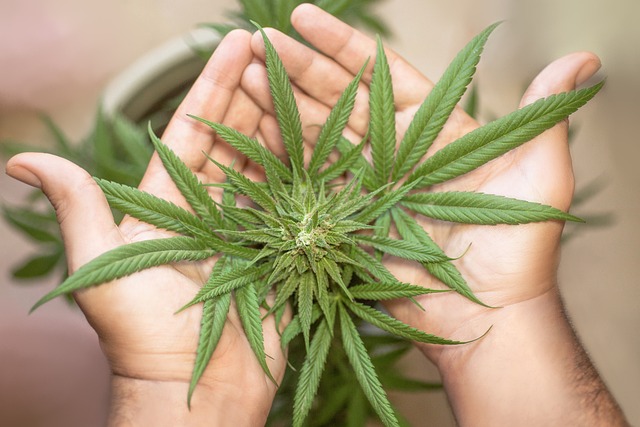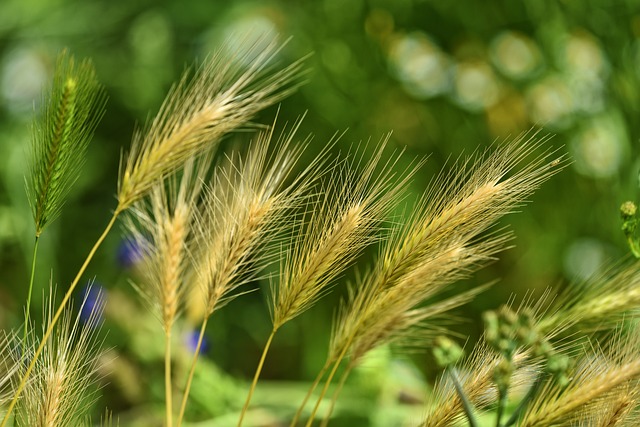
Delta-9 tetrahydrocannabinolic acid A (THCA) flower, a non-psychoactive cannabinoid found in the Cannabis sativa plant and a precursor to THC, is gaining attention for its potential to enhance mental clarity. Research suggests that THCA flower interacts with the endocannabinoid system, which may improve focus and acuity by modulating brain activity without inducing psychoactive effects. The unique terpene profile of THCA flower, including myrcene, pinene, and limonene, is believed to contribute additional cognitive-enhancing and neuroprotective benefits. Studies are investigating how THCA flower might aid in reducing mental fog and improving memory, with a focus on its anti-inflammatory and therapeutic potential for cognitive function. Users are advised to consume it responsibly, within legal frameworks, and to be aware of individual physiological differences that can affect its impact. It's important to approach THCA flower use cautiously, especially for those sensitive to THC or experiencing side effects like mild paranoia or anxiety. For optimal experiences, consider the setting, stay hydrated and nourished, and seek professional advice, particularly for individuals with mental health concerns.
Exploring the nuanced effects of THCA flower on cognitive and mental health, this article sheds light on its potential impact on mental clarity. From its scientific basis to practical considerations, we delve into how this cannabinoid-rich plant may enhance or challenge mental acuity, highlighting both its cognitive benefits and side effects. Understanding the balance between therapeutic advantages and possible adverse reactions is crucial for those considering THCA flower as part of their wellness regimen. Join us as we navigate the intricate relationship between THCA flower and mental clarity.
- Unraveling THCA Flower's Impact on Mental Clarity: A Comprehensive Overview
- The Science Behind THCA Flower and Its Effects on Cognitive Function
- Potential Side Effects of THCA Flower and Their Management Strategies
- Balancing Benefits and Risks: Thorough Analysis of THCA Flower Consumption for Mental Well-being
Unraveling THCA Flower's Impact on Mental Clarity: A Comprehensive Overview

Delta-9 tetrahydrocannabinolic acid (THCA) flower, the non-psychoactive precursor to the well-known THC, has garnered attention for its potential effects on mental clarity. Research suggests that THCA flower may offer cognitive benefits, which could enhance focus and acuity. The presence of THCA in cannabis strains is believed to interact with the body’s endocannabinoid system, influencing neurotransmitter release and modulating brain activity without the psychoactive effects associated with THC. This interaction has been studied for its potential role in improving mental clarity, a state where individuals can think clearly, focus effectively, and perform cognitive tasks with heightened acuity.
Furthermore, anecdotal evidence and preliminary studies indicate that certain individuals report heightened mental clarity after consuming THCA flower, suggesting it may aid in reducing mental fog and improving memory recall. The terpene profile of THCA flower, which includes myrcene, pinene, and limonene, among others, is thought to contribute to these cognitive-enhancing effects by promoting neuroprotection and potentially mitigating stress responses that can cloud thinking. As such, THCA flower for mental clarity is an area of growing interest, with ongoing research aimed at elucidating the mechanisms behind its potential benefits to cognitive function. Users interested in exploring the effects of THCA flower on mental clarity are encouraged to do so responsibly and in accordance with local laws and regulations.
The Science Behind THCA Flower and Its Effects on Cognitive Function

Delta-9-tetrahydrocannabinol (THC) is well-known for its psychoactive effects, but its precursor, tetrahydrocannabinolic acid A (THCA), has garnered attention for its potential therapeutic properties. THCA is the non-psychoactive form of THC found abundantly in raw cannabis plants and flowers. Research suggests that THCA interacts with the endocannabinoid system, a complex network that plays a significant role in regulating various physiological processes, including cognitive function.
Studies indicate that THCA flower may offer benefits for mental clarity and cognitive performance. Preclinical research has shown that THCA can exert neuroprotective effects and may have anti-inflammatory properties, which could be beneficial in managing conditions characterized by inflammation or neurodegeneration. Additionally, THCA’s interaction with the CB1 and CB2 receptors has been implicated in modulating neurotransmitter release and potentially enhancing cognitive processing. While the effects of THCA on cognition are still under investigation, anecdotal evidence and early clinical trials point to its potential role in improving mental clarity and focus for some individuals. As with any substance, it is crucial to approach its use with an understanding of personal physiology and to adhere to legal guidelines and professional medical advice.
Potential Side Effects of THCA Flower and Their Management Strategies

Consumption of THCA flower, which is the raw form of tetrahydrocannabinolic acid, a cannabinoid found in the Cannabis sativa plant, has been associated with various effects on mental clarity. While some users report enhanced focus and cognitive function, others may experience side effects such as mild paranoia or anxiety if they are sensitive to THC or consume it in high doses. These psychological effects can vary greatly depending on individual physiology, the potency of the THCA flower, and the user’s prior experience with cannabinoids.
To mitigate potential side effects, it is advisable to start with small, measured doses and gradually increase as tolerance builds. Environmental factors also play a crucial role; consuming in a comfortable, familiar setting can enhance the positive effects and reduce the likelihood of adverse experiences. Additionally, individuals should be mindful of their overall well-being, including hydration status and dietary intake, to support optimal mental function. For those experiencing negative side effects such as anxiety or paranoia, management strategies include staying in a safe, calm environment, engaging in relaxation techniques like deep breathing, or consuming CBD-rich products which may counteract the psychoactive effects of THC. It is also recommended to consult with a healthcare professional before incorporating THCA flower into one’s wellness regimen, particularly if there are pre-existing mental health concerns.
Balancing Benefits and Risks: Thorough Analysis of THCA Flower Consumption for Mental Well-being

THCA flower, which contains Tetrahydrocannabinolic Acid, a non-psychoactive precursor to THC, has garnered attention for its potential therapeutic properties, particularly for mental well-being. Proponents suggest that THCA flower may offer mental clarity benefits due to its interaction with the endocannabinoid system, which regulates mood and cognition. Consumption of THCA is believed to stimulate anandamide production, often referred to as the ‘bliss molecule,’ enhancing focus and cognitive function. However, it is crucial to approach its use with a balanced perspective, considering both the purported benefits and potential risks.
Research indicates that THCA flower may alleviate symptoms associated with stress and anxiety, offering a calming effect without the psychoactive effects of THC. This distinction can be particularly appealing for individuals seeking relief from mental health challenges without altering their state of consciousness. Nonetheless, the impact of THCA flower can vary significantly among users due to individual physiology, dosage sensitivity, and product purity. It is essential to consider factors such as the user’s medical history, current medications, and the quality of the THCA flower product when evaluating its role in mental well-being. Consulting healthcare professionals experienced in cannabinoid therapies can provide guidance tailored to individual needs, ensuring a safe and effective approach to using THCA flower for mental clarity.
In our exploration of the effects of THCA flower on mental clarity, it is clear that while some individuals may experience enhanced cognitive function and heightened mental acuity, it is not without potential side effects. A thorough examination of the scientific literature indicates that careful consideration must be taken when incorporating THCA flower into one’s wellness regimen. The balance between benefits and risks for mental well-being is delicate and warrants a personalized approach to consumption and dosage. Users should be aware of the possible side effects, such as anxiety or paranoia, and employ management strategies accordingly to mitigate these experiences. Ultimately, THCA flower may offer a promising avenue for those seeking improved mental clarity, but it is imperative to approach its use with caution and informed guidance.







